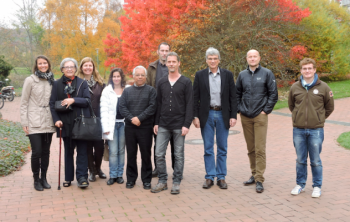TOF Workshop
(→Contributions) |
(→Contributions) |
||
| (7 intermediate revisions by one user not shown) | |||
| Line 1: | Line 1: | ||
==Background== | ==Background== | ||
| − | Trees outside the forest (TOF) play a significant role in context of biodiversity, carbon sequestration and other ecosystem functions on landscape level. With a shift towards a more holistic view on the landscape as a whole, these resources are gaining more and more attention also in context of international conventions and agreements like UNFCCC, CBD or REDD+. In many countries of the world carbon stocks in TOF are significantly higher than those | + | Trees outside the forest (TOF) play a significant role in context of biodiversity, carbon sequestration and other ecosystem functions on landscape level. With a shift towards a more holistic view on the landscape as a whole, these resources are gaining more and more attention also in context of international conventions and agreements like UNFCCC, CBD or REDD+. In many countries of the world carbon stocks in TOF are significantly higher than those of forest areas that comply with a forest definition. The increasing information need on such resources triggers discussions on options and restrictions in regard to their monitoring. Standard forest inventory approaches usually fail for the assessment of TOF resources, mainly because of their relatively low density and spatial distribution. From an inventory perspective TOF are a "rare event" and therefore a challenge for common sampling techniques. |
| − | A one-day workshop on TOF was held on October 30. at the [http://www.uni-goettingen.de/en/67094.html Chair of Forest Inventory and Remote Sensing] at the Georg-August-Universität Göttingen. Participants from Embrapa (Brazilian Agricultural Research Cooperation, the World Bank and researchers from Göttingen came together to discuss general aspects of TOF and their assessment and questions on how to integrate TOF monitoring in national forest inventories. | + | A one-day workshop on TOF was held on October 30. at the [http://www.uni-goettingen.de/en/67094.html Chair of Forest Inventory and Remote Sensing] at the Georg-August-Universität Göttingen. Participants from Embrapa (Brazilian Agricultural Research Cooperation), the World Bank and researchers from Göttingen came together to discuss general aspects of TOF and their assessment and questions on how to integrate TOF monitoring in national forest inventories. |
| − | + | Further information of the mission of Emprapa is available [http://sectordialogues.org/pt-br/noticia/representantes-da-embrapa-florestas-participam-de-missao-europa here]. | |
| + | {{wide image-noborder|TOF.banner.jpg|1340}} | ||
| + | |||
| + | ==Contributions== | ||
| + | [[file:clim0007-outubro-missao2.png|thumb|350px|right|Representatives of Embrapa Florestas and scientists at Georg-August-Universität Göttingen]] | ||
'''[[:File:TOF_NFI-BR.pdf|Brazilian National Forest Inventory (NFI-BR)]]''' | '''[[:File:TOF_NFI-BR.pdf|Brazilian National Forest Inventory (NFI-BR)]]''' | ||
''Dr. Yeda Maria Malheiros de Oliveira'', Embrapa Forestry | ''Dr. Yeda Maria Malheiros de Oliveira'', Embrapa Forestry | ||
Latest revision as of 09:52, 20 January 2016
[edit] Background
Trees outside the forest (TOF) play a significant role in context of biodiversity, carbon sequestration and other ecosystem functions on landscape level. With a shift towards a more holistic view on the landscape as a whole, these resources are gaining more and more attention also in context of international conventions and agreements like UNFCCC, CBD or REDD+. In many countries of the world carbon stocks in TOF are significantly higher than those of forest areas that comply with a forest definition. The increasing information need on such resources triggers discussions on options and restrictions in regard to their monitoring. Standard forest inventory approaches usually fail for the assessment of TOF resources, mainly because of their relatively low density and spatial distribution. From an inventory perspective TOF are a "rare event" and therefore a challenge for common sampling techniques.
A one-day workshop on TOF was held on October 30. at the Chair of Forest Inventory and Remote Sensing at the Georg-August-Universität Göttingen. Participants from Embrapa (Brazilian Agricultural Research Cooperation), the World Bank and researchers from Göttingen came together to discuss general aspects of TOF and their assessment and questions on how to integrate TOF monitoring in national forest inventories.
Further information of the mission of Emprapa is available here.
[edit] Contributions
Brazilian National Forest Inventory (NFI-BR) Dr. Yeda Maria Malheiros de Oliveira, Embrapa Forestry
Integrating Trees Outside Forests into a National Forest Monitoring System
Prof. Dr. Christoph Kleinn, Universität Göttingen
Sampling for landscape elements – A case study from Lower Saxony, Germany
Dr. Lutz Fehrmann, Universität Göttingen
Sampling trees
Dr. Sebastian Schnell, SLU Sweden
Monitoring of coffee agroforestry systems using optical remote sensing
Dr. Hans Fuchs, Universität Göttingen

